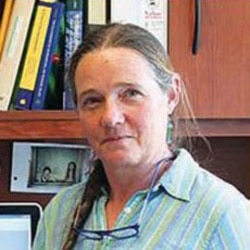Click Arrow to Hear This Program:
Or download MP3 (Right-click or option-click and save link)
AA: I'm Avi Arditti and this week on WORDMASTER: We follow up on last week's advice to parents about the language benefits of talking to babies. Mariah Evans at the University of Nevada, Reno, led a 20-year study which asked adults in 27 countries to estimate the number of books that were in their home while they were growing up. Their answers showed that children raised around books spend more years in school, even if their parents are poor and illiterate.
MARIAH EVANS: "What we found was that there is a very substantial effect of growing up in a bookish home on children's success in school. Children who grow up in homes where there are more books go further in education. And additional books are especially important for children who come from families where the parents aren't terribly highly educated.
"When you have very highly educated parents, you still get some result of additional books in the home. But you get much more of what you might call 'bang for your book' for parents who have little education."
AA: "Does it matter whether these are children's books or adult books? Are these the parents' books, or did you look at whose books these were?"
MARIAH EVANS: "They could be anything. So what you're looking at here is really a kind of average effect of different kinds of books. We've also got some research under way -- it's not been published, so it's not been peer-reviewed yet, so it has to be seen as a kind of a preview. But there, we're seeing that the books that have the most impact are history and science."
AA: "Now getting back to the idea of books in the home and a family library, after looking at the results of your study, what sort of message do you come away from your study with?"
MARIAH EVANS: "It helps make sense of findings that bookish people in otherwise not technologically very advanced places have gone far in education. So in that sense it says that there really is a contribution that parents can make to their children's education. And it doesn't mean that you have to turn into somebody like me whose walls are lined with books.
"But it really does mean that if you spend a few minutes most days a week reading to your children, and if they see you reading from time to time, and if you talk about books with them from time to time, and when somebody asks a question, say 'let's look it up' instead of discussing it as a matter of opinion -- that all those things can actually make quite a substantial difference to children in their education."
AA: "Right. And I guess it's stoking the curiosity, right, of encouraging curiosity and the desire to find the answer, to look it up somewhere."
MARIAH EVANS: "Yeah, and it also helps establish a kind of cultural outlook that answers can be discovered, that they're not just something that you have your view on and I have my view on and so on."
AA: "Let me ask you, then, nowadays where for so many people the first inclination is maybe instead of reaching for a book, perhaps, but going to a search engine, going to the Internet if they have access -- "
MARIAH EVANS: "Yes."
AA: " -- to a computer and the Internet, if you were to do this study twenty years from now, I'm curious what you would find and what that would say. Just perhaps because there are maybe fewer books in the house, well, maybe people are getting more information online."
MARIAH EVANS: "We don't know. So the question really is, are different kinds of information searches substitutable? My sense would be that they probably are. But at this point that's just talking through my digestion of bits and pieces of research. Nobody will really know for some time the answer to your question."
AA: "And last me ask you one more question here. In your findings here, you say that having a five hundred book library or having university educated parents, either one, propels a child three-point-two years further in education -- "
MARIAH EVANS: "Yeah."
AA: " -- on average. Now how many families did you find with a five hundred book library, or is that not particularly very big?"
MARIAH EVANS: "There are quite a few. As you saw, the average for the U.S. is a bit over a hundred. But for the U.S. about eighteen percent, actually, of families have a library of five hundred or more."
AA: Mariah Evans is an associate professor of sociology and resource economics at the University of Nevada, Reno. The study is in the journal Research in Social Stratification and Mobility. And that's WORDMASTER for this week. Archives are at voanews.com/wordmaster. I'm Avi Arditti.




